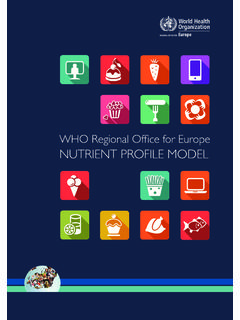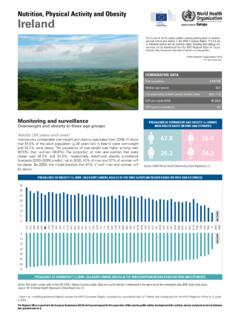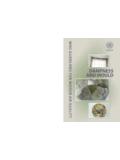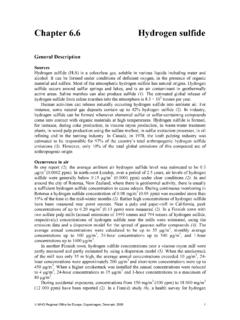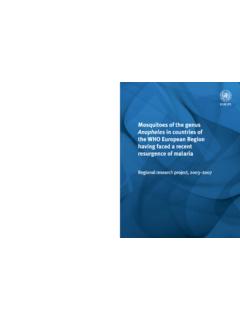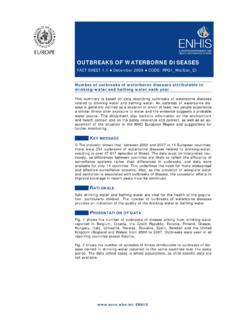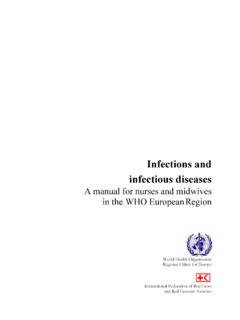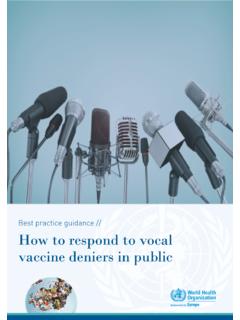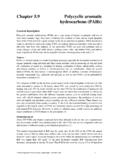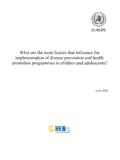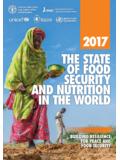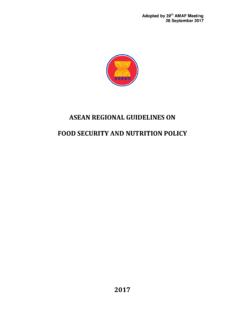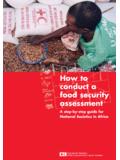Transcription of Food based dietary guidelines - World Health …
1 EUR/03/5045414. E79832. food based dietary guidelines in the WHO European Region nutrition and food security Programme WHO Regional Office for Europe Scherfigsvej 8, 2100 Copenhagen Denmark ABSTRACT. An unhealthy diet combined with physical inactivity increase the risk for non-communicable diseases (NCD). enormously. There is a clear need for political commitment to nutrition policies which will help prevent NCD. through provision of enough healthy, affordable food , especially fresh fruit and vegetables. Part of this political action should include the translation of nutrient population goals into food - based dietary guidelines at the national level. It is fundamental that the Ministry of Health endorses food - based dietary guidelines that are consistent and easily understood. The aim of this survey was to assess the existence of national, government- endorsed food - based dietary guidelines in Member States of the WHO European Region.
2 The findings of this survey illustrate important discrepancies between sub-regions and from country to country in national food - based dietary guidelines . Further effort will be required in the development of dietary guidelines as well as in the implementation of national nutrition policies. Keywords DIET - STANDARDS. guidelines . nutrition POLICY. nutrition SURVEYS. NATIONAL Health PROGRAMS. EUROPE. Address requests for copies of publications of the WHO Regional Office to for permission to reproduce them to and for permission to translate them to or contact Publications, WHO Regional Office for Europe, Scherfigsvej 8, DK-2100. Copenhagen , Denmark (tel.: +45 3917 1717; fax: +45 3917 1818; website: ). World Health Organization 2003. All rights reserved. The Regional Office for Europe of the World Health Organization welcomes requests for permission to reproduce or translate its publications, in part or in full.
3 The designations employed and the presentation of the material in this publication do not imply the expression of any opinion whatsoever on the part of the World Health Organization concerning the legal status of any country, territory, city or area or of its authorities, or concerning the delimitation of its frontiers or boundaries. Where the designation country or area . appears in the headings of tables, it covers countries, territories, cities, or areas. Dotted lines on maps represent approximate border lines for which there may not yet be full agreement. The mention of specific companies or of certain manufacturers' products does not imply that they are endorsed or recommended by the World Health Organization in preference to others of a similar nature that are not mentioned. Errors and omissions excepted, the names of proprietary products are distinguished by initial capital letters.
4 The World Health Organization does not warrant that the information contained in this publication is complete and correct and shall not be liable for any damages incurred as a result of its use. The views expressed by authors or editors do not necessarily represent the decisions or the stated policy of the World Health Organization. CONTENTS Page Acknowledgements 4. Summary 5. Introduction 6. Overview of results 8. Detailed results 10. 1. Variety in the diet 10. 2. Breads, grains, potatoes and pasta 12. 3. Vegetables and fruit 14. 4. Body weight and physical activity 16. 5. Fat 18. 6. Salt 20. 7. Sugar 22. 8. Lean meat, poultry, fish and legumes 24. 9. Milk and dairy products 26. 10. Alcohol 28. 11. food preparation 30. 12. Exclusive breastfeeding 32. Conclusions and recommendations 34. Annex 1: Twelve steps to healthy eating 36. Annex 2: The food based dietary guideline survey 2002 questionnaire 37.
5 3. Acknowledgements This document was prepared by the WHO Regional Office for Europe, nutrition and food security programme. Nina Roth carried out the survey and collated the data and Cecile Knai finalized this report. Sincere thanks are extended to the WHO nutrition counterparts and nutrition experts for submitting information on national food - based dietary guidelines and for allowing this work to be carried out. They are (in alphabetical order, by country): Dr Marita Afezolli (Albania); Dr Josep M. Casals Alis (Andorra); Dr Marietta Basilisian (Armenia); Dr Basti Bagyrova (Azerbaijan); Dr Fritz Wagner (Austria); Professor Natalia Kolomiets (Belarus); Mr van Havere (Belgium); Dr Aida Filipovic- Hadziomeragic (Bosnia & Herzegovina); Dr Fatima Jusupovic (Bosnia & Herzegovina); Professor Stefka Petrova (Bulgaria); Dr Antoinette Kaic-Rak (Croatia); Dr Zuzana Brazdova (Czech Republic).
6 Dr Lars Ovesen (Denmark); Dr Sirje Vaask (Estonia); Dr Kaija Hasunen (Finland); Dr Michel Chauliac (France); Dr Astrid Potz (Germany); Dr Ramaz Urushadze (Georgia); Professor Antonia Trichopoulou (Greece); Dr Gabor Zajkas (Hungary); Dr Laufey Steingrimsdottir (Iceland); Ms Ursula O'Dwyer (Ireland); Dr Dorit Nitzan Kaluski (Israel); Professor Anna Ferro- Luzzi (Italy); Dr Tourgeldy S. Sharmanov (Kazakhstan); Dr Ljudmila Nikola Davydova (Kyrgyzstan); Dr Olafs Stengrevics (Latvia); Prof Algis Abaravicius (Lithuania); Ms Sylvie Paquet (Luxembourg); Professor Elisaveta Stikova (The Former Yugoslav Republic of Macedonia); Ms Maria Ellul (Malta); Mr Robbert Top (Netherlands); Dr Arnhild Haga Rimestad (Norway); Dr Lucjan Szponar (Poland); Professor Amorim Cruz (Portugal); Professor Nicolae I. Opopol (Republic of Moldova); Dr Camelia Parvan (Romania); Professor Viktor Tutelian (Russian Federation); Dr Milan Kovac (Slovak Republic); Dr Mojca Gabrijelcic- Blenkus (Slovenia); Ms Maria Luz Carretero Baeza (Spain); Mrs Ulla Hagman (Sweden); Dr J rg L thy (Switzerland); Mr Khotambeg Khairov (Tajikistan); Mrs Bilge Y ksel (Turkey); Dr Kaka A.
7 Amangeldiev (Turkmenistan); Ms Imogen Sharp (United Kingdom); Prof Vyacheslav G. Perederiy (Ukraine); Dr Serzod Zakirhodzaev (Uzbekistan). 4. Summary An unhealthy diet combined with physical inactivity increase the risk for NCD enormously. NCD such as cardiovascular diseases, cancer, hypertension, obesity and type 2 diabetes are increasing within the European Region. There is a clear need for political commitment in developing adequate nutrition policies. These should help prevent NCD through the provision of enough healthy, affordable food , especially fresh fruit and vegetables in addition to the reduction of nutritional deficiencies. Part of this political action should include the translation of nutrient population goals into food - based dietary guidelines (FBDG) at the national level. It is fundamental that the Ministry of Health endorse FBDG that are consistent and easily understood.
8 Many primary care experts and other Health specialists have the opportunity to disseminate information on healthy eating. FBDG should be adapted to a country's specific needs; ensure that the nutrient needs of the population are covered; and contribute in reducing the risk of cardiovascular diseases. In addition, they should be in accord with public policies that promote food safety and physical activity, a healthy environment and a local food economy. The aim of this survey was to assess the existence of national, government-endorsed food - based dietary guidelines in Member States of the WHO European Region. Of the 48 participating countries, 25 reported having national, government-endorsed food - based dietary guidelines ;. 8 reported having national food - based dietary guidelines that were either in preparation and/or not yet endorsed by the government; 6 reported not having food - based dietary guidelines and 9 did not reply to the questionnaire.
9 The findings of this survey illustrate important discrepancies between sub-regions and from country to country in national food - based dietary guidelines . Further effort will be required in the development of dietary guidelines as well as in the implementation of national nutrition policies. 5. Introduction The combination of an unhealthy diet and physical inactivity increases the risk for NCD. enormously. NCD such as cardiovascular diseases, cancer, hypertension, obesity and type 2. diabetes are increasing within the European Region. There is a clear need for political commitment in developing adequate nutrition policies. These should help prevent NCD through the provision of enough healthy, affordable food , especially fresh fruit and vegetables in addition to the reduction of nutritional deficiencies. Part of this political action should include the translation of nutrient population goals into food - based dietary guidelines (FBDG) at the national level.
10 It is fundamental that the Ministry of Health endorse FBDG that are consistent and easily understood. Many primary care experts and other Health specialists have the opportunity to disseminate information on healthy eating. FBDG should be adapted to a country's specific needs; ensure that the nutrient needs of the population are covered; and contribute in reducing the risk of cardiovascular diseases. In addition, they should be in accord with public policies that promote food safety and physical activity, a healthy environment and a local food economy. Specific recommendations will vary from country to country based on the availability and cultural acceptance of foods. To make their implementation feasible and effective, FBDG must take account of dietary patterns and the prevalence of both deficiency disorders and NCD in each country. Health professionals should review the premature mortality rates, morbidity data and the available data on diet and nutritional status before developing their national FBDG.
